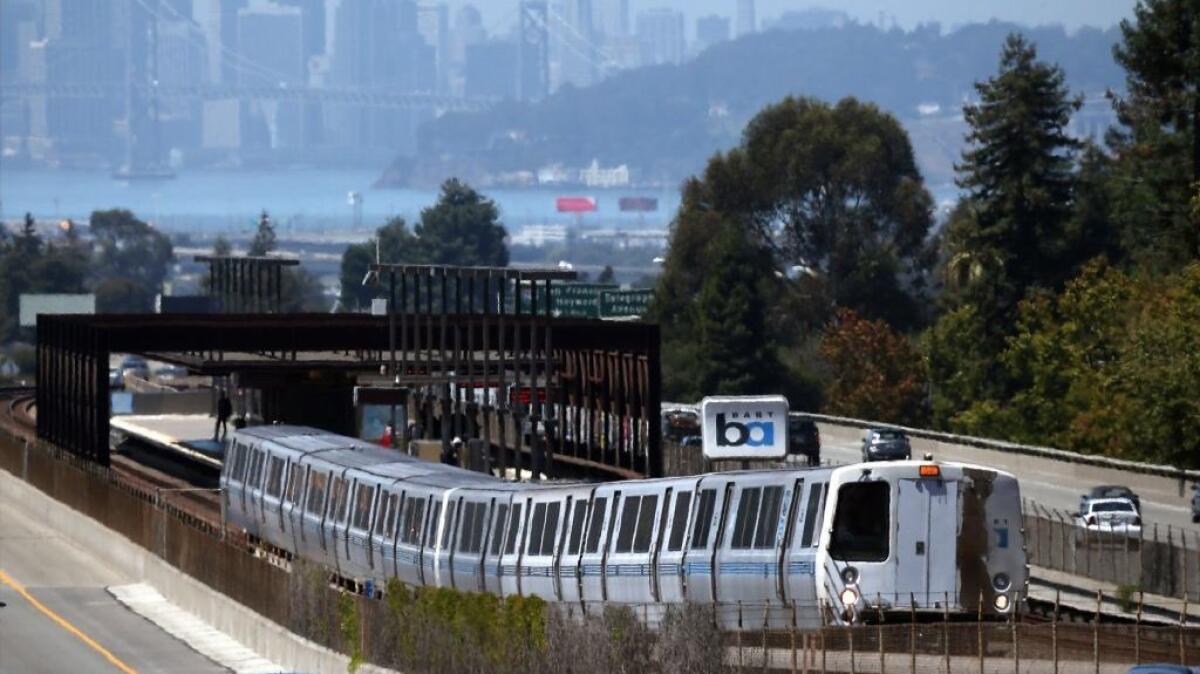BART rail system may designate itself a ‘sanctuary in transit’

The busiest rapid transit rail system in the state could soon become a “sanctuary in transit” for people who are in the country illegally.
The governing board of the Bay Area Rapid Transit system — better known as BART — may soon consider adopting a policy that would limit its police force from enforcing federal immigration laws. The transit system serves San Francisco and several other Bay Area cities.
“I’m deeply convinced that the train and transit system should not be part of a deportation machine,” said Lateefah Simon, a BART board director.
If BART does end up designating itself a sanctuary in transit, it would be the first such agency to do so. But it would join dozens of cities, including San Francisco, across the country that have declared themselves sanctuaries.
The move comes at a time when immigrant rights activists have urged communities to defy President Trump, who has vowed to deport millions of people in the country illegally and pull federal funding from so-called sanctuary cities.
Earlier this month, San Francisco sued the Trump administration, charging that its crackdown on sanctuary cities violates the states’ rights provisions of the U.S. Constitution. San Francisco, one of 400 sanctuary cities and counties in the country, stands to lose more than $1.2 billion a year in federal funding, most of it for healthcare, nutrition and other programs for the poor, according to City Atty. Dennis Herrera.
The city’s lawsuit contends that Trump’s executive order violated the 10th Amendment, which establishes a balance of power between the federal government and states.
On Thursday, Simon, of Oakland, and Nick Josefowitz, also a BART board director from San Francisco — proposed the idea of studying what it would mean to make the transit system a sanctuary.
Specifically, they asked staff to investigate a policy for possible adoption that would limit the cooperation of BART police with immigration enforcement officials.
For instance, the proposal would call for restricting assistance to federal agents in enforcing federal immigration laws and limiting BART police officers’ ability to book a suspect into a jail where the county does not have a sanctuary policy.
Also, the policy would call for limiting information shared directly with other federal agencies, such as the Joint Terrorism Task Force, fearing that it may lead to indiscriminate enforcement of immigration laws.
“We need to know what it [the policy] would mean legally, politically and financially,” Simon said. “It’s important to understand what we would be putting forward to the board. I personally feel like it’s the right thing to do.”
An estimated 240,000 immigrants without legal status live in San Francisco, Oakland and Hayward, according to a recent report by the Pew Research Center. Another 120,000 live in the South Bay area of San Jose, Sunnyvale and Santa Clara, the report found.
Many of these people ride BART every day, Simon said.
She said BART officials are there to make sure trains are running on time and safely, not to serve as an arm of Immigration and Customs Enforcement.
“All of the undocumented folks I’ve worked with in my life are just trying to secure their citizenship, and they are working, paying taxes and paying BART fare,” she said. “I want to be on the right side of history.”
BART’s existing policy allows transit police to provide services such as traffic control or policing during a federal operation if immigration officials request it, according to its police department policy handbook.
Simon said BART police are also permitted to call or turn over to immigration officials people they suspect may be in the country illegally under the current policy.
In practice, however, BART police have not contacted or transported anyone to immigration officials in the last four years they’ve researched, Simon said.
“It’s my hope that if this passes, it’ll be a model,” she said. “I hope it gets picked up by other cities, such as Los Angeles, Boston, Detroit and Washington.”
Follow Cindy Carcamo on Twitter @thecindycarcamo
ALSO
Raids across the U.S. leave immigrant communities and activists on high alert
Immigration arrests heighten fears in Southern California as hoaxes, false rumors swirl
More to Read
Start your day right
Sign up for Essential California for news, features and recommendations from the L.A. Times and beyond in your inbox six days a week.
You may occasionally receive promotional content from the Los Angeles Times.







